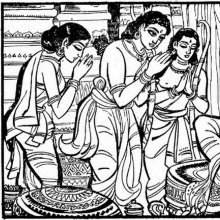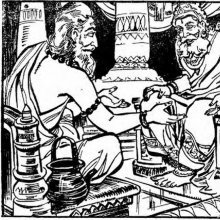Sumitra, Sumitrā, Su-mitra: 22 definitions
Introduction:
Sumitra means something in Buddhism, Pali, Hinduism, Sanskrit, Jainism, Prakrit. If you want to know the exact meaning, history, etymology or English translation of this term then check out the descriptions on this page. Add your comment or reference to a book if you want to contribute to this summary article.
Sumitra has 21 English definitions available.
Images (photo gallery)
Languages of India and abroad
Sanskrit dictionary
[Deutsch Wörterbuch]
Source: Cologne Digital Sanskrit Dictionaries: Böhtlingk and Roth Grosses Petersburger WörterbuchSumitra (सुमित्र):—
1) adj. (f. ā) ein guter Freund [Ṛgveda 1, 91, 12. 10, 105, 11.] [Taittirīyasaṃhitā 1, 4, 45, 2.] sumitraḥ saṃkrūramakaḥ [Pañcaviṃśabrāhmaṇa 13, 6, 10. 9.] sumitra voc. [Bhāgavatapurāṇa 3, 19, 32.] —
2) m. Nomen proprium a) eines Unholds [Mahābhārata 3, 14167.] — b) verschiedener Männer: ein Ṛṣi und Liedverfasser mit dem patron. Vādhryaśva [Ṛgveda 10, 69, 3. 5.] pl. [1. 7. 8.] Kautsa, Liedverfasser von [10, 105. -] [Mahābhārata 2, 105.] ein Fürst der Sauvīra [Mahābhārata 1, 2699. 5537. 2, 120. 1069. 12, 4629. fgg.] von Mithilā [Rgva tch’er rol pa ed. Calc. 24, 13.] [Lebensbeschreibung Śākyamuni’s 235 (5).] von Magadha und Vater des Arhant Suvrata [Hemacandra’s Abhidhānacintāmaṇi 38.] [Śatruṃjayamāhātmya 10, 322.] Wagenlenker Abhimanyu's [Mahābhārata 7, 1537.] Sohn Gada's [Harivaṃśa 9193.] Śyāma’s [1943] (nach der Lesart der neueren Ausg.). Śamīka’s (Samīka’s) [Bhāgavatapurāṇa 9, 24, 43.] Kṛṣṇa’s [?10, 61, 11. PAÑCAR. 2, 4, 46 (?).] Vṛṣṇi’s [Viṣṇupurāṇa 424.] [Bhāgavatapurāṇa 9, 24, 11.] Agnimitra's [HALL] in der Einl. zu [VĀSAVAD. 53.] Suratha's, mit ihm erlischt das Geschlecht Ikṣvāku’s [Viṣṇupurāṇa 464.] [Bhāgavatapurāṇa 9, 12, 15. -] [Daśakumāracarita 3, 10. 9, 20.] —
3) f. ā Nomen proprium a) einer Yakṣiṇī [Kathāsaritsāgara 108, 48.] — b) einer Gattin Daśaratha’s, Mutter Lakṣmaṇa’s und Śatrughna’s, [Rāmāyaṇa 1, 19, 7. 2, 31. 11. 40, 3. 64, 72.] [Raghuvaṃśa 10, 56. 14, 51.] der Mutter Mārkaṇḍeya’s [Oxforder Handschriften 82,b,31.] Jayadeva's [142,a,4. 5.] — Vgl. saumitra fg.
Sanskrit, also spelled संस्कृतम् (saṃskṛtam), is an ancient language of India commonly seen as the grandmother of the Indo-European language family (even English!). Closely allied with Prakrit and Pali, Sanskrit is more exhaustive in both grammar and terms and has the most extensive collection of literature in the world, greatly surpassing its sister-languages Greek and Latin.
See also (Relevant definitions)
Partial matches: Mitra, Cu, Shu.
Starts with: Sumitrabhu, Sumitradhas, Sumitrarupa, Sumitratanaya, Sumitravijaya.
Ends with: Nandisumitra, Vasumitra.
Full-text (+62): Saumitra, Sumitrabhu, Lakshmanaprasu, Lakshmana, Shatrughnajanani, Sumitratanaya, Sumitta, Shatrughna, Saumitri, Sumitradhas, Suratha, Munisuvrata, Anamitra, Asuratha, Aikshvaku, Somitti, Dasharatha, Dattamitra, Cumittirai, Kautsa.
Relevant text
Search found 40 books and stories containing Sumitra, Sumitrā, Su-mitra, Su-mitrā; (plurals include: Sumitras, Sumitrās, mitras, mitrās). You can also click to the full overview containing English textual excerpts. Below are direct links for the most relevant articles:
Rig Veda (translation and commentary) (by H. H. Wilson)
Hanuman Nataka (critical study) (by Nurima Yeasmin)
9.13. The character of Sumitrā < [Chapter 4]
11. Use of Prākṛta < [Chapter 4]
Hanuman-Nāṭaka, Act 13 (Summary) < [Chapter 3]
Chaitanya Bhagavata (by Bhumipati Dāsa)
Verse 2.10.15 < [Chapter 10 - Conclusion of the Lord’s Mahā-prakāśa Pastimes]
Verse 3.8.175-176 < [Chapter 8 - Mahāprabhu’s Water Sports in Narendra- sarovara]
Verse 1.8.109 < [Chapter 8 - The Disappearance of Jagannātha Miśra]
Puranic encyclopaedia (by Vettam Mani)
The Skanda Purana (by G. V. Tagare)
Chapter 12 - Glorification of Maṅgala Tīrtha < [Section 1 - Setu-māhātmya]
Chapter 20 - Greatness of Bālamaṇḍana Tīrtha < [Section 1 - Tīrtha-māhātmya]
Chapter 98 - Greatness of Rājavāpī < [Section 1 - Tīrtha-māhātmya]
Trishashti Shalaka Purusha Caritra (by Helen M. Johnson)
Part 6: Episode of Sumitra and Padma < [Chapter I - Previous incarnations of Ariṣṭanemi (Nemi)]
Part 9: Story of Ratnavatī and Anaṅgasiṃha < [Chapter I - Previous incarnations of Ariṣṭanemi (Nemi)]
Part 9: Birth of Padma (Rāma) and Lakṣmaṇa < [Chapter IV - The, birth, marriage, and retreat to the forest of Rāma and Lakṣmaṇa]
Related products


